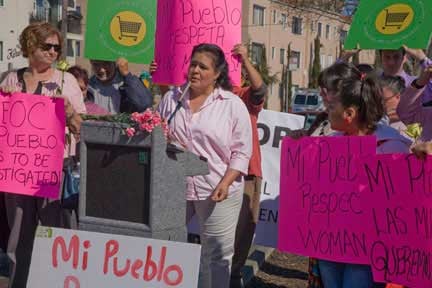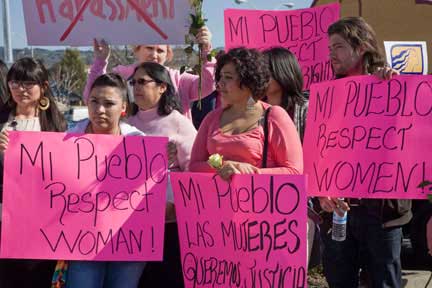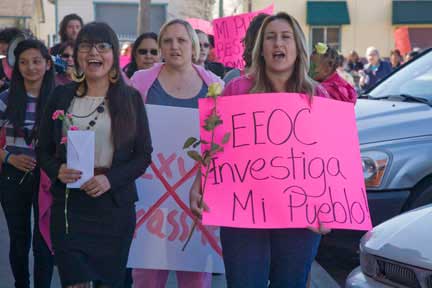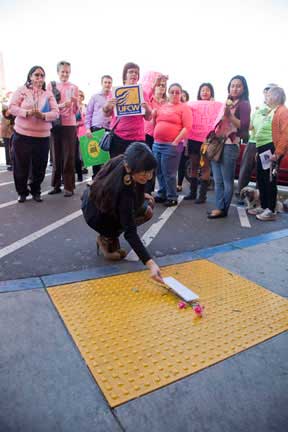
Valentine’s Day sometimes brings chocolates and flowers, but in Oakland, California, it brought angry women out to the Mi Pueblo supermarket in the heart of the barrio. There they tried to speak to the chain’s owner, Juvenal Chavez, not about love, but about the sexual harassment of women and the firing of whistleblowers who work at the chain.
As they gathered next to the parking lot holding pink placards, Latino families in pickup trucks and beat-up cars honked and waved. Laura Robledo then stepped up to an impromptu podium and told her story. As she spoke, her teenage daughter held her protectively around the waist and stared angrily at the doorway, where managers stood waiting for trouble.
Robledo used to work at the Mi Pueblo market in San Jose. She lost her job when she complained to the company that she’d been sexually harassed by a coworker. “I had two witnesses who heard everything he said,” she recalled. “The words were so low and degrading it was horrible just to hear them. He even tried by force to kiss and embrace me.”
So she complained to the company. That was unusual, because workers at the markets who complain about intimidation by managers subsequently lose their jobs, according to the protesters.
Fear at Mi Pueblo has been high since last August, when the company announced it was using the E-Verify database to check employees’ immigration status. Then in October, company lawyer Julie Pace said the Immigration and Customs Enforcement (ICE) agency was auditing Mi Pueblo’s personnel records. Almost all the chain’s workers are immigrants.
In each store, employees were herded into meetings, where they were shown a video in which Chavez told them that if their immigration status was questioned, they would be fired. “The possibility of losing one of our employees will hurt my heart,” he assured them. “And it will feel like losing a family member.”
When Robledo went to the company to report the harassment, however, she says it didn’t feel at all like a family. “They said they’d investigate it,” she recounted. “But they did nothing. After two weeks they gave me a letter saying they’d finished their investigation and that nothing had happened and that workers were always treated with respect. For me this was terrible. I felt very humiliated because I could see they didn’t respect my rights as a woman.”
Robledo was a new employee, having only started working at the store that October. The harassment began almost immediately, she said. Despite getting the letter claiming she had no basis for her charges, she continued working. Robledo is a single mother of three children and couldn’t afford to quit.
The company then made that decision for her. “I worked a couple of weeks after getting the letter,” she recalled. “Then they accused me of getting into an argument with another worker, which wasn’t true. It was just a pretext. They fired me because I kept complaining about sexual harassment. They knew that because I know my rights, and I’m willing to defend myself, that eventually I’d expose the truth.” Perla Rodriguez, a spokesperson for Mi Pueblo, would not comment on Robledo’s case “for legal reasons,” but she said that workers participate in mandatory courses in preventing sexual harassment. “We have all the policies and procedures in place that afford all our team members the opportunity to report any incident or concern so that our human resources department can investigate and take any corrective action that is necessary.”
As the Valentine’s Day crowd grew, Robledo, with her daughter beside her, led a group of some 100 coworkers and supporters through the parking lot, to the doors of the supermarket. There they found that beefy security guards had closed them. They stood in front glaring at the women, who chanted and shook the pink placards and the carnations they’d handed out as an ironic comment on the Day of Love at Mi Pueblo.
Robledo tried to explain that she was just there to give a letter to the store manager, asking for a meeting with Juvenal Chavez. The letter protested the injustice of her firing, while her alleged harasser continues to work. “Every Sunday,” it said, “during your radio program, we hear you saying that Mi Pueblo is a safe and dignifying place to shop and work. But the reality is that we are under a lot of pressure to make sure your company achieves its weekly and yearly sales goals. As a result, we suffer accidents and stress levels skyrocket.”
She pointed out that while each employee produces an average of $125,000 in annual sales, “many of us depend on subsidized public programs to make ends meet.” After asking to meet with him directly, the letter condemned the immigration enforcement actions against workers and asked Chavez to sign the Mercado code of conduct.
The code is the creation of the Mercado Workers Association, set up with the help of Local 5 of the United Food and Commercial Workers to pressure for better conditions in the Mexican food stores proliferating across northern California. The UFCW estimates that there are about 7,000 mercados nationally, which it defines as stores catering specifically to Latino and Asian neighborhoods. They employ about 300,000 workers throughout the country and about 30,000 in California.
Mi Pueblo, with 13 stores and 2,500 employees, is hardly the largest. That distinction belongs to Ranch 99 Supermarkets, with 31 stores in Asian communities and Gonzalez/NorthGate Mercados, with 30 markets in Latino neighborhoods.
The code’s demands include obeying wage and hour laws; providing regular paychecks, two days of sick leave and a five-day vacation after a year; fair advertising and business standards; and the right to organize and protest unfair conditions. Most important to Robledo, she said, is that it reads, “The Employer will not discharge or retaliate against any employee for the filing of a complaint over the enforcement of this Code or for filing a complaint with a government agency over violations of legally mandated workplace standards or rights.”
“I support the union effort at the stores,” Robledo said. “Many people don’t know their rights or how to defend themselves. If I’d had a union, it would have made a real difference because it would have supported me. I would have been able to count on someone.”
Along with Local 5 members in the Valentine’s Day protest were members of a local coalition called Dignity and Resistance. Speaking for it was Ana Castaño, who told the crowd about her own experience getting fired in an immigration document audit at the Pacific Steel Castings foundry in Berkeley a year before. “What we learned,” she said, “is that we have to have a voice. Firing us for not having papers, or firing Laura for protesting sexual harassment, it’s all unjust. We can only stop it if we speak out, instead of being afraid.”
Juvenal Chavez, if he was in the store, never came out to confront his critics. The guards maintained their vigil, even though keeping the doors closed meant turning away customers. Finally, Robledo laid her letter down on the pavement in front of the entrance and placed her pink carnations on top of it. One by one, the other women added their flowers to the bunch.
The only one who didn’t was Robledo’s daughter. “I’m really angry at them,” she declared. “I’m not going to give them any flowers.” She said her mother made her feel proud. “I think she’s really brave to stand up for her rights.”
As she got into the van to leave, Robledo said she’d be back. “I’m here to get justice about what was done to me,” she said. “I’ve tried to give Juvenal Chavez my letter three times, and he’s never been willing to receive it. I will continue what I’m doing until I get justice.”
 Laura Robledo and her daughter. (Photo: David Bacon)
Laura Robledo and her daughter. (Photo: David Bacon)
 Ana Castaño talks about losing her job in an I-9 immigration audit at Pacific Steel. (Photo: David Bacon)
Ana Castaño talks about losing her job in an I-9 immigration audit at Pacific Steel. (Photo: David Bacon)
 The women get ready to march. (Photo: David Bacon)
The women get ready to march. (Photo: David Bacon)
 Laura Robledo, letter in hand, leads marchers through the parking lot. (Photo: David Bacon)
Laura Robledo, letter in hand, leads marchers through the parking lot. (Photo: David Bacon)
 But the guards close the doors and won’t let them in. (Photo: David Bacon)
But the guards close the doors and won’t let them in. (Photo: David Bacon)
 The demonstrators make their demand heard by chanting outside the store. (Photo: David Bacon)
The demonstrators make their demand heard by chanting outside the store. (Photo: David Bacon)
 A local immigrant rights activist demands that the store rehire Robledo. (Photo: David Bacon)
A local immigrant rights activist demands that the store rehire Robledo. (Photo: David Bacon)
 The pink placards call on Mi Pueblo to respect women, on the EEOC to investigate the stores, and demands justice for Robledo. (Photo: David Bacon)
The pink placards call on Mi Pueblo to respect women, on the EEOC to investigate the stores, and demands justice for Robledo. (Photo: David Bacon)
 Robledo puts her letter and carnations on the pavement in front of the doors. (Photo: David Bacon)
Robledo puts her letter and carnations on the pavement in front of the doors. (Photo: David Bacon)
 UFCW activists and other supporters add their carnations to hers. (Photo: David Bacon)
UFCW activists and other supporters add their carnations to hers. (Photo: David Bacon)
Press freedom is under attack
As Trump cracks down on political speech, independent media is increasingly necessary.
Truthout produces reporting you won’t see in the mainstream: journalism from the frontlines of global conflict, interviews with grassroots movement leaders, high-quality legal analysis and more.
Our work is possible thanks to reader support. Help Truthout catalyze change and social justice — make a tax-deductible monthly or one-time donation today.